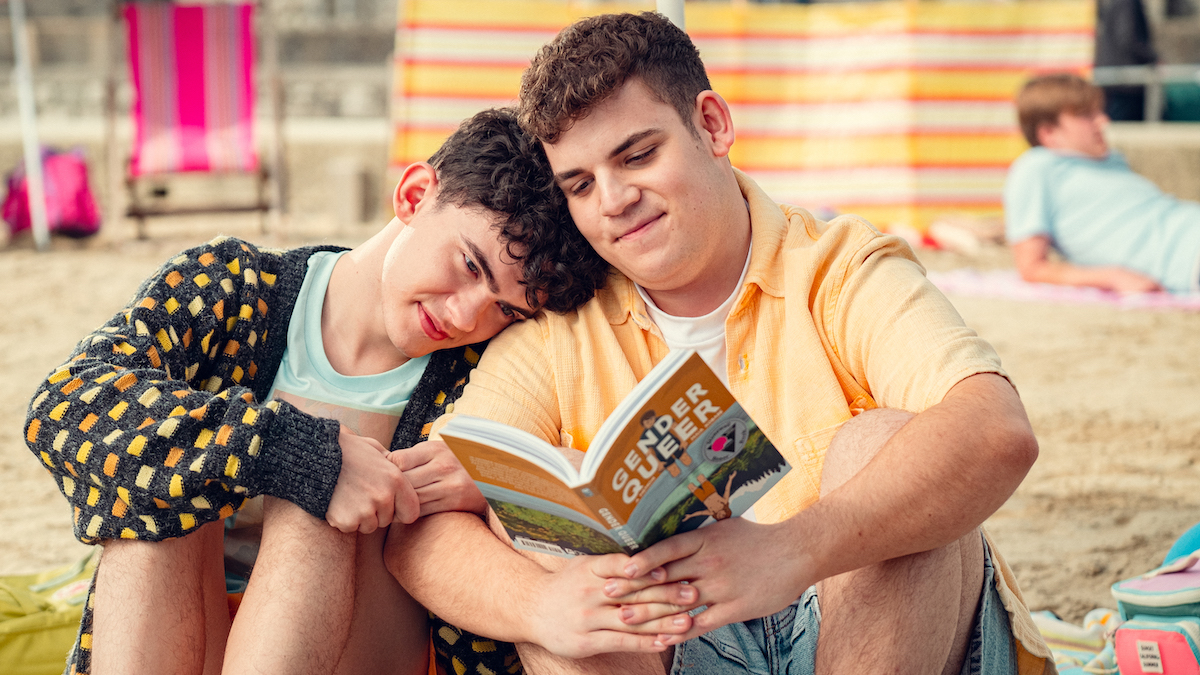The aromantic representation in ‘Heartstopper’ is so important

Heartstopper is back!
The season released on October 3 on Netflix, and fans (myself included) are already devouring it. Along with delving further into the growth and development of Nick and Charlie’s relationship, as well as Tao and Elle’s, it also gives more insight into our favorite classics-lover Isaac and how he views relationships.
(Warning: Spoilers for season three below.)
Isaac had begun to come to terms with being asexual in season two, but this season marks the first discussion of his aromanticism as well. In episode 2, “Love,” when Charlie is trying to figure out how to tell Nick that he loves him, he turns towards Isaac for advice. Isaac tells him that he doesn’t get the appeal of it, and, when asked further, says that he doesn’t with anybody. He then tells Nick that he doesn’t get butterflies when thinking about anybody. When Nick asks Isaac if he’s asexual, Isaac replies, “Probably aromantic, too.”
What is aromanticism?
Aromantic people simply don’t form romantic attraction to people and see no desire in having romantic relationships. A common misconception, however, is that we don’t experience any love whatsoever. The opposite is true, in fact. You can be aromantic and still deeply love friends and family.
I wish I had had a show like Heartstopper in high school, since I went through many of the things Isaac did. When my friends started dating, I did, too, but it always felt half-hearted at best. I never really felt anything past the crush stage. I would often tell myself that it would change once I found the right person. I hopped from relationship to relationship thinking that I was broken, because I just never cared the way society said I should. I had been kissing since middle school, but always ran from even the idea of a relationship. I never even fantasized about my future marriage like most girls my age did.
One thing that really stuck out with me was Isaac saying that he liked the idea of romance, he just didn’t want it for himself. For the first time, I felt truly seen. I love the idea of romance–I write it and read it frequently–but when I try to project those ideas and situations on myself, I come up blank. Nothing seems to fit, and it all feels wrong.
I didn’t fully understand the idea of aromanticism until I was in my thirties. It isn’t an easy thing to understand, or even come to terms with. This is actually my first time speaking about it outside of my private circle. It’s a bit frightening, but it’s also important to discuss. I want people going through the same things I did to know that they aren’t broken and that they don’t need to wait for somebody to magically fix them.
Even today, though, I still grapple with it from time to time. Sometimes when I’m watching a rom-com, or even just a show or a movie where a character is dealing with relationship woes, I get that voice in my head that tells me that I should be like that, and that I’ve wasted so much of my life already. It’s wrong; I know. But sometimes I can’t help wondering how I would have turned out if I had had a character like Isaac to look towards in my youth.
Why is it so important?
The facts are simple: The representation for the aro-ace community, which makes up 1-4% of the current population, is sparse. Of course, it really boils down to not being profitable, but how is that in any way fair? Those are still individual lives that can be changed.
Most aro-ace representation is also grossly misrepresented, and can oftentimes fall under the “coldhearted” trope. Or, worse, the “person who just needs to find the right person to change” trope. Both are damaging, to say the least, and not accurate whatsoever. As I said before, we feel love. We jus don’t want romance.
Heartstopper author Oseman is on the aro-ace spectrum herself. Aromantics and asexuals often overlap as well. It’s important for kids like Oseman, kids like me, to feel that sense of community, especially in adolescence. It’s a difficult enough time already, and it’s why we should be encouraging authors like Oseman and inspiring those like her.
None of this is to say that I dislike this aspect of myself, either. Recently, thanks to shows like Heartstopper, and even shows like Our Flag Means Death, I’ve learned to embrace these things. They make me unique. They make me me. Arguably, that is one of the most important messages of Isaac’s storyline.
The world is difficult, and can oftentimes feel small, but it’s so grand and beautiful and diverse, too. Especially once you find your people. When the group accepts Isaac at the aquarium when he comes out, no question, I thought: This is it. This is what I want for the younger generation. To see themselves and their potential reflected back at them, rather than be told they’re wrong or that they can be fixed.
This is an opinion piece. The views expressed in this article are those of just the author.